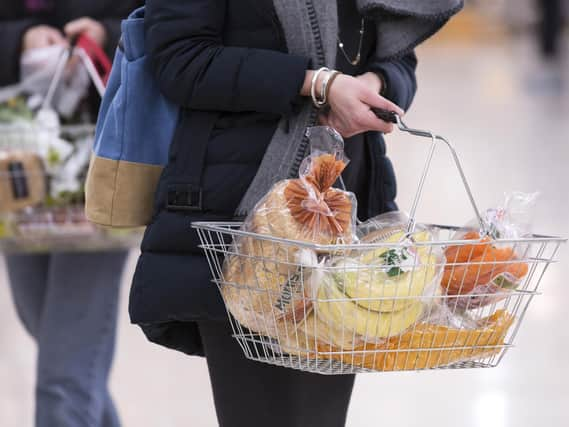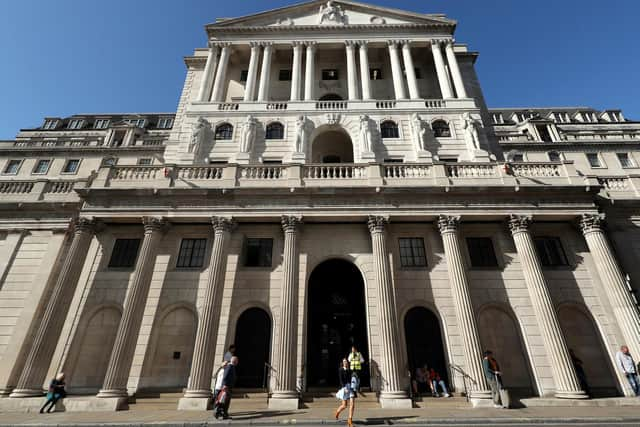Inflation is coming our way, here's what you need to know - Sarah Coles


The fact I can no longer fill the car with petrol without muttering ‘Really? How much?’ and that I had to check the carpenter was only quoting me for fitting a bathroom door rather than refitting the entire bathroom, were sure enough signs. But inflation figures still give us a good indication of what’s happening overall to prices, and what we can do about it.
The biggest jump in inflation for more than 20 years, to 3.2 per cent, owes something to Rishi Sunak and his BOGOF meal deal last summer. The Eat Out to Help Out scheme artificially pushed prices down last August, which automatically pushed inflation up a year later. It’s responsible for about 0.4 percentage points of the change.
Advertisement
Hide AdAdvertisement
Hide AdBut aside from this, there are some eye-watering price rises.


Petrol prices have fuelled much of the pain. This time last year they were up slightly from lockdown lows to 113.1 pence per litre, but by this August they had shot up to 134.6 pence per litre, their highest in eight years.
Food prices are starting to creep up too. These are relatively small rises in prices across the basket, which are being compared to falls a year earlier. However, it’s likely to be a sign of things to come, as retailers have started warning us that supply chain problems are going to push prices up even further soon.
The cost of some big-ticket items is skyrocketing too, which doesn’t touch everyone’s finances, but makes a huge difference if they do. Used cars for example were up 4.9 per cent in one month alone.
Advertisement
Hide AdAdvertisement
Hide AdHaving an idea where prices have been increasing, helps us to keep a lid on costs and build our financial resilience. With the price of petrol rising so fast, anything we can do to cut back on how much we use will make a huge difference. Ideally, we could all rethink how much we drive and whether there are alternatives for any of these journeys.
However, even if we’ve done everything we can on that front, it’s worth considering efficient driving techniques – from avoiding excessive acceleration and braking to ensuring the tyres have enough air in them before you set off. Driving around looking for cheaper petrol is a false economy, but checking petrolprices.com for the cheapest petrol station you pass on the way to work is a sensible way to ensure you never pay too much.
Price rises in the supermarket have been slower, so they’re harder to spot. One way to keep an eye on the cost of the things you buy regularly is to keep a receipt and take it to the supermarket with you. That way, you can quickly check to see whether the price has changed, and if it has, you can look for cheaper alternatives.
When we’re trying to plan for the future, the big question is always what’s going to happen to inflation next. And the jury is out on that one. The Bank of England expects prices to keep rising, and for inflation to hit 4 per cent towards the end of 2021, before dropping again. But with no supply chain solution in sight, there’s a chance some of this inflation could hang around for longer than expected.
Advertisement
Hide AdAdvertisement
Hide AdThis is all pretty miserable news for savers, because if your savings are in an account paying interest at a rate lower than inflation, you’re losing the spending power of your cash every day.
You can’t beat inflation in a normal savings account at the moment, but that doesn’t mean you should give up. Your emergency savings fund of 3-6 months’ worth of essential expenses should be in a competitive easy access account. None of these are paying more than a fraction of inflation, but there’s a world of difference between an easy access account paying 0.01 per cent from a high street giant and the best on the market – which offers 65 times the interest (Tandem Bank offering 6.5 per cent).
Money you need within five years, but not immediately, can then be tied up for whatever period makes the most sense for your finances, in return for a better rate. And if you have money you don’t need for 5-10 years or more you should at least consider stock market investments, because while its value will rise and fall in the short term, you should be able to take advantage of long term growth in the markets.
One of the questions people always ask when they’re considering fixing their savings is whether there’s a risk that interest rates will go up, and leave their savings rate looking decidedly less than impressive. The jury is out on this one too. So far, the Bank of England has stuck firmly to the line that it won’t have to raise rates because inflation will naturally fall back once supply bottlenecks unwind and last year’s quirks fall out of the figures. However, we’ll be keeping an eye on the Monetary Policy Committee minutes next week to see how much this line is being tested.
Advertisement
Hide AdAdvertisement
Hide AdThere’s the chance of a rate rise next year, but there’s also a chance that we’ll be hit by something else unexpected that dampens demand and lowers inflationary pressures: a winter lockdown might do it. So rather than second-guessing what’s going to happen to rates months down the line, while your cash lies in a miserable easy access account paying 0.01 per cent, it’s best to switch to the best possible rate in the accounts that are right for you, and get your money working as hard as possible for you today.